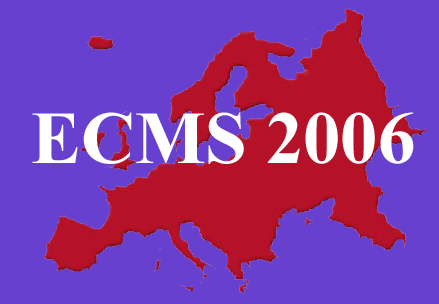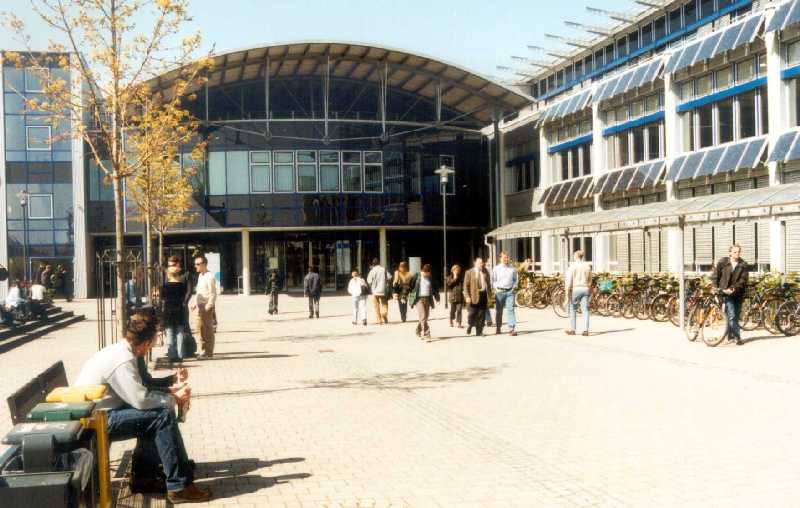
on Modelling and Simulation
ECMS 2006 (formerly referred to as 'SCS-ESM')
May
28th - 31st, 2006
Bonn, Germany
Keynote
Speech by
Prof. Lotfi Zadeh


A New Frontier in Computation—Computation with Information Described in Natural Language
Lotfi A. Zadeh*
Extended Abstract
What is meant by Computation with Information Described in Natural Language, or NL-Computation, for short? Does NL-Computation constitute a new frontier in computation? Do existing bivalent-logic-based approaches to natural language processing provide a basis for NL-Computation? What are the basic concepts and ideas which underlie NL-Computation? These are some of the issues which are addressed in the following.
What is computation with information described in natural language? Here are simple examples. I am planning to drive from Berkeley to Santa Barbara, with stopover for lunch in Monterey. It is about 10 am. It will probably take me about two hours to get to Monterey and about an hour to have lunch. From Monterey, it will probably take me about five hours to get to Santa Barbara. What is the probability that I will arrive in Santa Barbara before about six pm? Another simple example: A box contains about twenty balls of various sizes. Most are large. What is the number of small balls? What is the probability that a ball drawn at random is neither small nor large? Another example: A function, f, from reals to reals is described as: If X is small then Y is small; if X is medium then Y is large; if X is large then Y is small. What is the maximum of f? Another example: Usually the temperature is not very low, and usually the temperature is not very high. What is the average temperature? Another example: Usually most United Airlines flights from San Francisco leave on time. What is the probability that my flight will be delayed?
Computation with information described in natural language is closely related to Computing with Words. NL-Computation is of intrinsic importance because much of human knowledge is described in natural language. This is particularly true in such fields as economics, data mining, systems engineering, risk assessment and emergency management. It is safe to predict that as we move further into the age of machine intelligence and mechanized decision-making, NL-Computation will grow in visibility and importance.
Computation with information described in natural language cannot be dealt with through the use of machinery of natural language processing. The problem is semantic imprecision of natural languages. More specifically, a natural language is basically a system for describing perceptions. Perceptions are intrinsically imprecise, reflecting the bounded ability of sensory organs, and ultimately the brain, to resolve detail and store information. Semantic imprecision of natural languages is a concomitant of imprecision of perceptions.
Our approach to NL-Computation centers on what is referred to as generalized-constraint-based computation, or GC-Computation for short. A fundamental thesis which underlies NL-Computation is that information may be interpreted as a generalized constraint. A generalized constraint is expressed as X isr R, where X is the constrained variable, R is a constraining relation and r is an indexical variable which defines the way in which R constrains X. The principal constraints are possibilistic, veristic, probabilistic, usuality, random set, fuzzy graph and group. Generalized constraints may be combined, qualified, propagated, and counter propagated, generating what is called the Generalized Constraint Language, GCL. The key underlying idea is that information conveyed by a proposition may be represented as a generalized constraint, that is, as an element of GCL.
In our approach, NL-Computation involves three modules: (a) Precisiation module; (b) Protoform module; and (c) Computation module. The meaning of an element of a natural language, NL, is precisiated through translation into GCL and is expressed as a generalized constraint. An object of precisiation, p, is referred to as precisiend, and the result of precisiation, p*, is called a precisiand. Usually, a precisiend is a proposition, a system of propositions or a concept. A precisiend may have many precisiands. Definition is a form of precisiation. A precisiand may be viewed as a model of meaning. The degree to which the intension (attribute-based meaning) of p* approximates to that of p is referred to as cointension. A precisiand, p*, is cointensive if its cointension with p is high, that is, if p* is a good model of meaning of p.
The Protoform module serves as an interface between Precisiation and Computation modules. Basically, its function is that of abstraction and summarization.
The Computation module serves to deduce an answer to a query, q. The first step is precisiation of q, with precisiated query, q*, expressed as a function of n variables u1, …, un. The second step involves precisiation of query-relevant information, leading to a precisiand which is expressed as a generalized constraint on u1, …, un. The third step involves an application of the extension principle, which has the effect of propagating the generalized constraint on u1, …, un to a generalized constraint on the precisiated query, q*. Finally, the constrained q* is interpreted as the answer to the query and is retranslated into natural language.
The generalized-constraint-based computational approach to
NL-Computation opens the door to a wide-ranging enlargement of the role of
natural languages in scientific theories. Particularly important
application areas are decision-making with information described in
natural language, economics, systems engineering, risk assessment,
qualitative systems analysis, search, question-answering and theories of
evidence.
* Department of EECS, University of California, Berkeley, CA 94720-1776; Telephone: 510-642-4959; Fax: 510-642-1712;
E-Mail: zadeh@eecs.berkeley.edu . Research supported in part by ONR N00014-02-1-0294, BT Grant CT1080028046, Omron Grant, Tekes Grant, Chevron Texaco Grant and the BISC Program of UC Berkeley.
Curriculum Vitae
Lotfi A. Zadeh
Lotfi A. Zadeh joined the Department of Electrical Engineering at the University of California, Berkeley, in 1959, and served as its chairman from 1963 to 1968. Earlier, he was a member of the electrical engineering faculty at Columbia University. In 1956, he was a visiting member of the Institute for Advanced Study in Princeton, New Jersey. In addition, he held a number of other visiting appointments, among them a visiting professorship in Electrical Engineering at MIT in 1962 and 1968; a visiting scientist appointment at IBM Research Laboratory, San Jose, CA, in 1968, 1973, and 1977; and visiting scholar appointments at the AI Center, SRI International, in 1981, and at the Center for the Study of Language and Information, Stanford University, in 1987-1988. Currently he is a Professor in the Graduate School, and is serving as the Director of BISC (Berkeley Initiative in Soft Computing).
Until 1965, Dr. Zadeh's work had been centered on system theory and decision analysis. Since then, his research interests have shifted to the theory of fuzzy sets and its applications to artificial intelligence, linguistics, logic, decision analysis, control theory, expert systems and neural networks. Currently, his research is focused on fuzzy logic, soft computing, computing with words, and the newly developed computational theory of perceptions and precisiated natural language.
An alumnus of the University of Tehran, MIT, and Columbia University, Dr. Zadeh is a fellow of the IEEE, AAAS, ACM, AAAI and IFSA, and a member of the National Academy of Engineering. He held NSF Senior Postdoctoral Fellowships in 1956-57 and 1962-63, and was a Guggenheim Foundation Fellow in 1968. Dr. Zadeh was the recipient of the IEEE Education Medal in 1973 and a recipient of the IEEE Centennial Medal in 1984. In 1989, Dr. Zadeh was awarded the Honda Prize by the Honda Foundation, and in 1991 received the Berkeley Citation, University of California.
In 1992, Dr. Zadeh was awarded the IEEE Richard W. Hamming Medal "For seminal contributions to information science and systems, including the conceptualization of fuzzy sets." He became a Foreign Member of the Russian Academy of Natural Sciences (Computer Sciences and Cybernetics Section) in 1992, and received the Certificate of Commendation for AI Special Contributions Award from the International Foundation for Artificial Intelligence. Also in 1992, he was awarded the Kampe de Feriet Prize and became an Honorary Member of the Austrian Society of Cybernetic Studies.
In 1993, Dr. Zadeh received the Rufus Oldenburger Medal from the American Society of Mechanical Engineers "For seminal contributions in system theory, decision analysis, and theory of fuzzy sets and its applications to AI, linguistics, logic, expert systems and neural networks." He was also awarded the Grigore Moisil Prize for Fundamental Researches, and the Premier Best Paper Award by the Second International Conference on Fuzzy Theory and Technology. In 1995, Dr. Zadeh was awarded the IEEE Medal of Honor "For pioneering development of fuzzy logic and its many diverse applications." In 1996, Dr. Zadeh was awarded the Okawa Prize "For outstanding contribution to information science through the development of fuzzy logic and its applications."
In 1997, Dr. Zadeh was awarded the B. Bolzano Medal by the Academy of Sciences of the Czech Republic "For outstanding achievements in fuzzy mathematics." He also received the J.P. Wohl Career Achievement Award of the IEEE Systems, Science and Cybernetics Society. He served as a Lee Kuan Yew Distinguished Visitor, lecturing at the National University of Singapore and the Nanyang Technological University in Singapore, and as the Gulbenkian Foundation Visiting Professor at the New University of Lisbon in Portugal. In 1998, Dr. Zadeh was awarded the Edward Feigenbaum Medal by the International Society for Intelligent Systems and the Richard E. Bellman Control Heritage Award by the American Council on Automatic Control. In addition, he received the Information Science Award from the Association for Intelligent Machinery and the SOFT Scientific Contribution Memorial Award from the Society for Fuzzy Theory in Japan. In 1999, he was elected to membership in Berkeley Fellows and received the Certificate of Merit from IFSA (International Fuzzy Systems Association). In 2000, he received the IEEE Millennium Medal; the IEEE Pioneer Award in Fuzzy Systems; the ASPIH 2000 Lifetime Distinguished Achievement Award; and the ACIDCA 2000 Award for the paper, "From Computing with Numbers to Computing with Words—From Manipulation of Measurements to Manipulation of Perceptions." In addition, he received the Chaos Award from the Center of Hyperincursion and Anticipation in Ordered Systems for his outstanding scientific work on foundations of fuzzy logic, soft computing, computing with words and the computational theory of perceptions. In 2001, Dr. Zadeh received the ACM 2000 Allen Newell Award for seminal contributions to AI through his development of fuzzy logic. In addition, he received a Special Award from the Committee for Automation and Robotics of the Polish Academy of Sciences for his significant contributions to systems and information science, development of fuzzy sets theory, fuzzy logic control, possibility theory, soft computing, computing with words and computational theory of perceptions. In 2003, Dr. Zadeh was elected as a foreign member of the Finnish Academy of Sciences, and received the Norbert Wiener Award of the IEEE Society of Systems, Man and Cybernetics “For pioneering contributions to the development of system theory, fuzzy logic and soft computing.” In 2004, Dr. Zadeh was awarded Civitate Honoris Causa by Budapest Tech (BT) Polytechnical Institution, Budapest, Hungary. Also in 2004, he was awarded the V. Kaufmann Prize, International Association for Fuzzy-Set Management and Economy (SIGEF).
Dr. Zadeh is a recipient of twenty-three honorary doctorates from: Paul-Sabatier University, Toulouse, France; State University of New York, Binghamton, NY; University of Dortmund, Dortmund, Germany; University of Oviedo, Oviedo, Spain; University of Granada, Granada, Spain; Lakehead University, Canada; University of Louisville, KY; Baku State University, Azerbaijan; the Silesian Technical University, Gliwice, Poland; the University of Toronto, Toronto, Canada; the University of Ostrava, the Czech Republic; the University of Central Florida, Orlando, FL; the University of Hamburg, Hamburg, Germany; the University of Paris(6), Paris, France; Jahannes Kepler University, Linz, Austria; University of Waterloo, Canada; and the University of Aurel Vlaicu, Arad, Romania; Lappeenranta University of Technology, Lappeenranta, Finland; Muroran Institute of Technology, Muroran, Japan; Hong Kong Baptist University, Hong Kong, China.
Dr. Zadeh has single-authored over two hundred papers and serves on the editorial boards of over fifty journals. He is a member of the Advisory Committee, Center for Education and Research in Fuzzy Systems and Artificial Intelligence, Iasi, Romania; Senior Advisory Board, International Institute for General Systems Studies; the Board of Governors, International Neural Networks Society; and is the Honorary President of the Biomedical Fuzzy Systems Association of Japan and the Spanish Association for Fuzzy Logic and Technologies. In addition, he is a member of the Advisory Board of the National Institute of Informatics, Tokyo; a member of the Governing Board, Knowledge Systems Institute, Skokie, IL; and an honorary member of the Academic Council of NAISO-IAAC.
Professor
in the Graduate School and Director, Berkeley Initiative in Soft Computing
(BISC), Computer Science Division, Department of EECS, University of
California, Berkeley, CA 94720-l776; Telephone: 5l0-642-4959; Fax:
5l0-642-l7l2; E-mail: zadeh@eecs.berkeley.edu
http://www.cs.berkeley.edu/~zadeh/
Page created by M.-M. Seidel Last update 21-05-06.
© Copyright ECMS - All Rights Reserved

